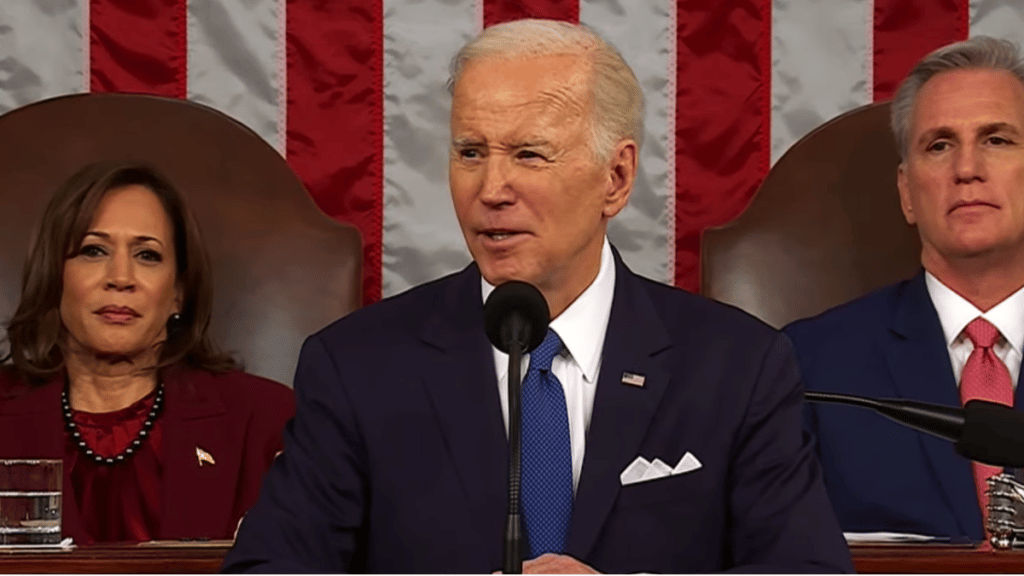Kids Online Safety Featured in State of the Union Address
John Perrino / Feb 7, 2023John Perrino is a policy analyst at the Stanford Internet Observatory.

President Joe Biden advocated for legislative action on children’s privacy and online safety during the State of the Union address to a joint session of Congress tonight.
“We must finally hold social media companies accountable for the experiment they are running on our children for profit,” said Biden. “And it’s time to pass bipartisan legislation to stop Big Tech from collecting personal data on kids and teenagers online, ban targeted advertising to children, and impose stricter limits on the personal data these companies collect on all of us.”
Prior to the State of the Union address, the White House released a statement indicating that the president would call for social media and other online social platforms to “prioritize the privacy and wellbeing of young people above profit and revenue in their product design, including safety by design standards and practices.”
President Biden also gave a nod to his competition agenda, calling on Congress to “[p]ass bipartisan legislation to strengthen antitrust enforcement and prevent big online platforms from giving their own products an unfair advantage.”
Addressing his administration’s infrastructure priorities, President Biden touted broadband funding and affordability programs that passed in the last Congress. “We’re making sure that every community has access to affordable, high-speed internet. No parent should have to drive to a McDonald’s parking lot so their kid can do their homework online,” Biden said.
Biden Speaks. But Will Congress Act?
It’s an open question whether any of these policy priorities can advance with a split Congress, but it’s possible the speech will be a prelude to legislative, regulatory and executive action on Big Tech accountability and online safety priorities.
The Kids Online Safety Act (KOSA) would require social media platforms to set default privacy and security settings to the strongest option for children 16 or younger, and provide access for parents or guardians to control safety settings for their children on social media platforms. It would also mandate researcher access to data for studying how social media affects young users.
KOSA has prominent bipartisan backers in Sens. Richard Blumenthal (D-CT) and Marsha Blackburn (R-TN), and narrowly missed inclusion in the federal spending bill last December even after facing significant civil society and industry opposition. The senators say they plan to reintroduce the legislation very soon.
The American Data Privacy and Protection Act (ADPPA) advanced out of committee in the last Congress. The bill faced opposition from powerful California Democrats who feared it would supersede that state’s existing privacy legislation.
The White House is at something of a crossroads for technology policy. President Biden recently authored aWall Street Journal op-ed calling for bipartisan cooperation on data privacy, Section 230, algorithmic transparency, and antitrust measures. But even as the President signals these issues are important to his agenda, there are changes at key posts. Top White House officials Tim Wu, who served as a key advisor on antitrust issues and technology policy, and Alondra Nelson, deputy director of the Office of Science and Technology Policy, recently announced their departures.
In the year ahead, expect the Biden administration and Congress to continue to push for action on children’s online safety, targeting the design of social media and video games. Such efforts may prove popular: a Knight Foundation poll released on Monday found that nearly 9 in 10 Americans are concerned about the impact social media has on children’s mental health.
This week, Democratic FTC Commissioner Alvaro Bedoya touted the FTC’s $520 million fine, levied in December against Epic Games, the maker of the popular online video game Fortnite. Bedoya stressed that the FTC will continue to focus on the design of platforms; the fine against Epic Games penalized a lack of protections against strangers talking to young users, in addition to children’s privacy violations.
Last week, Surgeon General Vivek Murthy told CNN he personally believes “13 is too early” for children to be on social media as they are still developing their identity, calling for more transparency from social media companies and research on mental health effects. Last Thursday, legislation was introduced by Rep. Chris Stewart (R-UT) that would ban social media access for children 16 and younger.
While Biden’s focus on the issue suggests children’s online safety legislation has momentum, many of the same questions and criticisms remain from the last Congress. The speech may be over, but the debate will continue.
Authors
